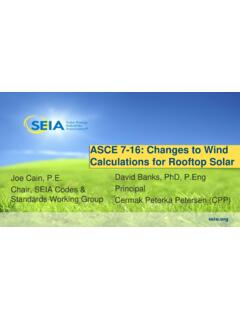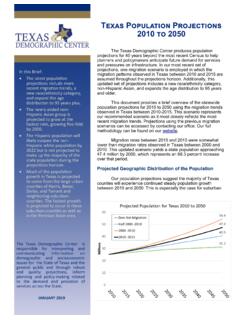Transcription of Contemporary Issues and Trends in Education - HEC
1 Semester 6 Contemporary Issues and Trends in EducationWINDOWS ON PRACTICE (Hons.) Elementary2012 This product has been made possible by the support of the American People through the United States Agency for International Development (USAID). The contents of this report are the sole responsibility of the authors, and do not necessarily reflect the views of USAID or the United States Support: Education Development Center (EDC); Teachers College, Columbia (HONS) ELEMENTARYiiForewordTeacher Education in Pakistan is leaping into the future. This updated Scheme of Studies is the latest milestone in a journey that began in earnest in 2006 with the development of a National Curriculum, which was later augmented by the 2008 National Professional Standards for Teachers in Pakistan and the 2010 Curriculum of Education Scheme of Studies.
2 With these foundations in place, the Higher Education Commission (HEC) and the USAID Teacher Education Project engaged faculty across the nation to develop detailed syllabi and course guides for the four-year (Hons) Elementary and the two-year Associate Degree in Education (ADE).The syllabi and course guides have been reviewed by the National Curriculum Review Committee (NCRC ) and the syllabi are approved as the updated Scheme of Studies for the ADE and (Hons) Elementary an educator, I am especially inspired by the creativity and engagement of this updated Scheme of Studies. It offers the potential for a seismic change in how we educate our teachers and ultimately our country s youngsters.
3 Colleges and universities that use programmes like these provide their students with the universally valuable tools of critical thinking, hands-on learning, and collaborative am grateful to all who have contributed to this exciting process; in particular the faculty and staff from universities, colleges, and provincial institutions who gave freely of their time and expertise for the purpose of preparing teachers with the knowledge, skills, and dispositions required for nurturing students in elementary grades. Their contributions to improving the quality of basic Education in Pakistan are incalculable. I would also like to thank the distinguished NCRC members who helped further enrich the curricula by their recommendations.
4 The generous support received from the United States Agency for International Development (USAID) enabled HEC to draw on technical assistance and subject-matter expertise of the scholars at Education Development Center, Inc., and Teachers College, Columbia University. Together, this partnership has produced a vitally important resource for DR. SOHAIL NAQVIE xecutive DirectorHigher Education CommissionIslamabadiiiCOURSE GUIDE: Contemporary Issues and Trends in EducationIntroductionAs part of nationwide reforms to improve the quality of teacher Education , the Higher Education Commission (HEC), with technical assistance from the USAID Teacher Education Project, engaged faculty across the nation to develop detailed syllabi for courses in the new four-year (Hons) Elementary programme.
5 The process of designing the syllabus for each course in years 3 4 of the programme began with a curriculum design workshop. Deans and directors from universities where these courses will be taught identified faculty to attend the workshop. The first workshop included national and international subject matter experts who led participants in a seminar focused on a review and update of subject (content) knowledge. The remainder of this workshop was spent reviewing the HEC Scheme of Studies, organizing course content across the semester, developing detailed unit descriptions, and preparing the course syllabi. Although the course syllabi are designed primarily for Student Teachers taking the course, they are useful resources for teacher educators, too.
6 Following the initial workshop, faculty participants developed teaching notes that include ideas for teaching units of study and related resources. Working individually or in groups, participants focused on their teaching methods and strategies and how they could be useful to future teachers of the course. Subsequent workshops were held over the course of a year to give faculty sufficient time to complete their work, engage in peer review, and receive critical feedback from national and international consultants. In designing both the syllabi and the teaching notes, faculty and subject matter experts were guided by the National Professional Standards for Teachers in Pakistan (2009).
7 All of the syllabi developed by faculty who participated in the process are included in this document, along with a list of topical teaching notes. Additional references and resources appear at the end of the document. These should provide a rich resource for faculty who will teach the course in the future. This Windows on Practice guide is not intended to provide a complete curriculum with a standard syllabus and fully developed units of study, but rather aims to suggest ideas and resources for Instructors to use in their own planning. Hence, readers will find sample units and materials that reflect the perspective of faculty designers rather than prescriptions for (HONS) ELEMENTARYivWe respect intellectual property rights and to the best of our knowledge, we have not included any suggested materials that are copyright protected or for which we have not secured explicit permission to use.
8 Therefore, all materials included may be used in classrooms for educational purposes. Materials in this document are not intended for commercial use, however. They may not be used in other publications without securing permission for their drafts were reviewed by the National Curriculum Review Committee (NCRC) and suggestions were incorporated into final drafts, which were then submitted to the NCRC for approval. Faculty involved in course design: Dr Asaf Niwaz, Hazara University, Haripur; Bashir Nasir, Shah Abdul Latif University, Khairpur; Intizar Hussain, University of Karachi, Sindh; Mahvish Naseem, Fatima Jinnah Women University, Rawalpindi; Dr Naveed Sultana, Allama Iqbal Open University, Islamabad; Qadir Bux Laghari, Shah Abdul Latif University, Khairpur; Dr Muhammad Ramzan, Karakorum International University, Gilgit; Shehla Sheikh, Gomal University; and Shereen Taj, University of Balochistan, subject expert leading the seminar and design workshop: Dr Ameena Ghaffar-Kucher, Senior Lecturer, Graduate School of Education , University of Pennsylvania.
9 Date of NCRC review process: 11 12 January 2013 NCRC reviewers: Dr Ishtiaq Hussain, Institute of Education and Research, University of Science & Technology, Kohat; Dr Muhammad Ramzan, Karakorum International University, Gilgit; and Dr Saeed Khan, University of Haripur, Khyber GUIDE: Contemporary Issues and Trends in (HONS) ELEMENTARY06 Table of contents1 Rationale for a course on Contemporary Issues and Trends in Education ..08 Common misconceptions about Contemporary Issues in Education ..092 Course syllabi ..10 Syllabus 1: Dr Naveed Sultana and ..11 Mahvish Naseem Syllabus 2: Dr Asaf Nawaz, Shehla Sheikh, ..18 and Dr Muhammad Ramzan Syllabus 3: Shereen Taj, Intizar Hussain.
10 25 Qadir Bux Laghari, and Bashir Nasir3 Integrated teaching notes ..29 Introduction to the course ..30 Activities: Options 1 and 2 ..30 Notes for faculty ..31 Technology in Education ..33 Activities: Options 1 and 2 ..33 Notes for faculty and additional resources ..34 Gender disparity ..34 Activities: Options 1 and 2 ..34 Notes for faculty and additional resources ..35 Quotations on gender equity ..35 Conflict resolution ..36 Activities: Options 1 and 2 ..36 Notes for faculty ..3807 COURSE GUIDE: Contemporary Issues and Trends in EducationTable of contents (cont.) Reading: What is conflict? ..39 Handout: Thinking about how to handle conflict.













